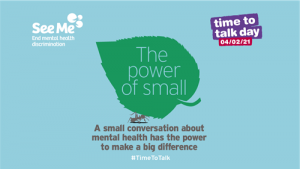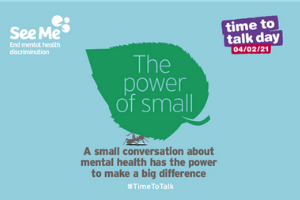Time to Talk Day 2021

Our mental health is as important as our physical health and, now more than ever, conversations must be had to help reduce stigma and support those with poor mental health.
Following the publication of “My Support, My Choice: People with Mental Health Problems’ Experiences of Self-directed Support and Social Care”, we know that stigma and discrimination is a concern for people accessing Self-directed Support (SDS) for mental health problems.
“People judge mental health. It’s still happening, and it’s been happening for a long time. They don’t think about the person at all; if the person looks OK, they think they are OK.” – My Support, My Choice participant
That’s why we’re supporting Time to Talk Day on Thursday 4 February 2021.
The theme this year is “The Power of Small” – highlighting the importance of having conversations about mental health, no matter how short, in-depth, general or personal.
For every conversation we have around mental health, myths can be busted and barriers can be broken down.
See Me Scotland has a range of resources to help you start up conversations with your family and friends including:
- Postcards to send to someone to ask how they are.
- Virtual events including a special chat with See Me Scotland ambassador, Radio 1 journalist, Shiona McCallum, TV presenter Gail Porter, youth champion Dean and See Me Proud champion Drew.
- Activity packs.
- Quiz questions.
Find out more about how you can get involved in Time to Talk Day here.
Did you know?
- According to figures published by NHS Scotland, an estimated one in six adults in Scotland experiences a mental health problem at any one time. This figure is higher among disabled people and people living with long term conditions, and is also higher among people living in Scottish Index of Multiple Deprivation (SIMD) communities.
- ISD data indicates that during 2017- 2018, 12,936 people accessed social care services for support with mental health problems (6.4% of people receiving social care support), and 5,959 people are indicated as belonging to the SDS ‘Mental Health’ client group.
For information and advice around SDS and mental health, please use our ‘Find Help’ tool at the top right of our website.

